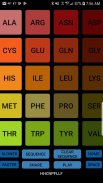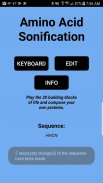





Amino Acid Synthesizer

Descrizione di Amino Acid Synthesizer
This app uses a self-consistent method to translate amino acid sequences into audible sound. The sonification method uses the normal mode vibrations of the amino acid building blocks of proteins to compute an audible representation of each of the 20 natural amino acids, which is fully defined by the overlay of its respective natural vibrations. The vibrational frequencies are transposed to the audible spectrum following the musical concept of transpositional equivalence, playing or writing music in a way that makes it sound higher or lower in pitch while retaining the relationships between tones or chords played. This transposition method ensures that the relative values of the vibrational frequencies within each amino acid and amongst different amino acids are retained.
The characteristic frequency spectrum and sound associated with each of the amino acids represents a type of musical scale that consists of 20 unique tones, the “amino acid scale”. To create a playable instrument, each tone associated with the amino acids is assigned to a specific key on the screen of your phone, which can be played. The app allows users to record sequences that were played, edit them, and share them for further processing (e.g. creating synthetic proteins based on the music composed, or predicting the folded structure of a sequence created through music).
The approach of creating audio representations of protein sequences offers a new avenue for understanding sequence patterns, variations, and mutations, and offers an outreach mechanism to explain the significance of protein sequences. The method reported here also offers insight into the effect of mutations through sound.
Scientific publication:
[1] Yu, C. H., Qin, Z., Martin-Martinez, F. and Buehler, M. J. A self-consistent sonification method to translate amino acid sequences into musical compositions and application in protein design using AI, in submission.
App developed by Eric L. Buehler






















